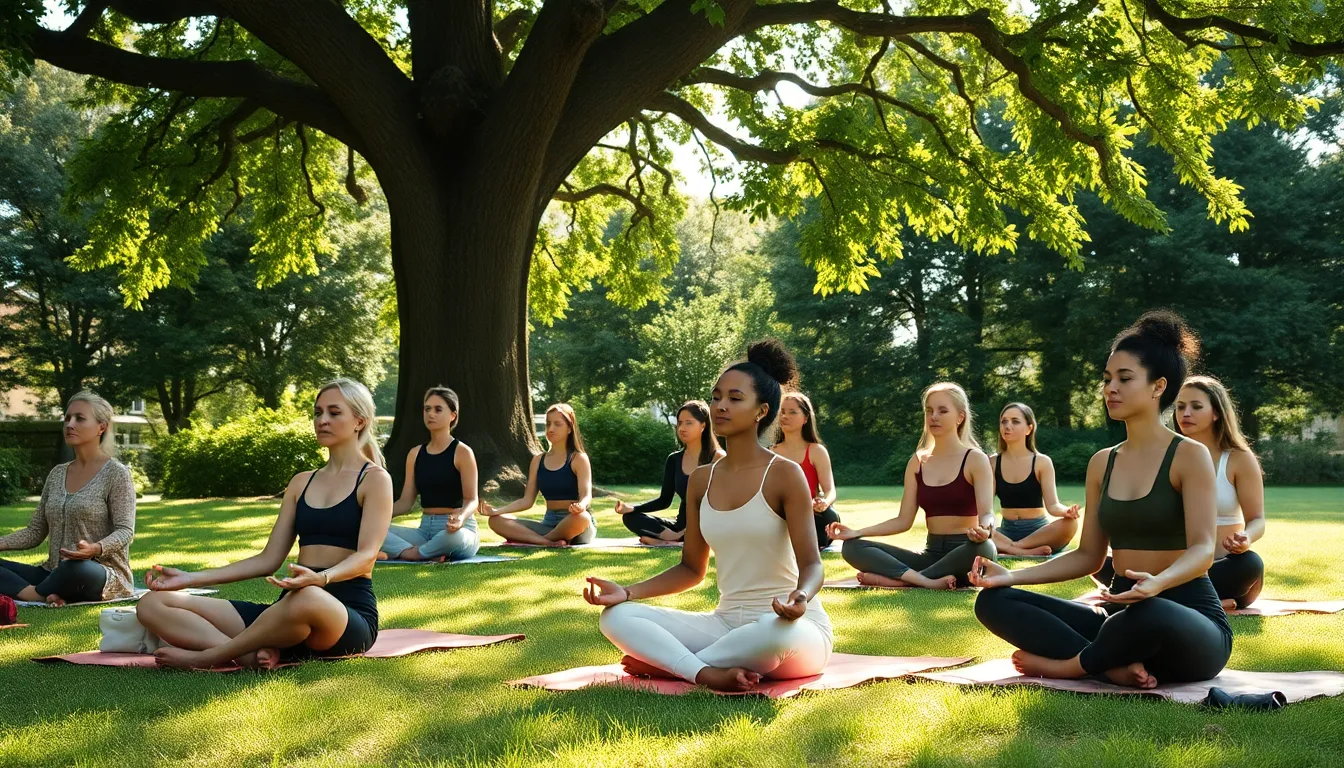Table of Contents
ToggleIn today’s fast-paced world, it’s easy to feel like a hamster on a wheel, racing through life without catching a breath. Enter mindfulness—the superhero of stress relief and focus. Practicing mindfulness isn’t just about sitting cross-legged and chanting “om.” It’s about tuning into the present moment, even if that moment involves a pile of laundry or a cat that thinks it’s a dog.
Mindfulness can transform the mundane into the magical, helping people navigate life’s chaos with grace. By embracing this practice, they can reduce anxiety, improve concentration, and maybe even find joy in that never-ending to-do list. So, why not take a pause, breathe deeply, and discover how mindfulness can turn everyday moments into extraordinary experiences?
Understanding Mindfulness
Mindfulness represents a state of active, open attention to the present moment. It involves observing thoughts and feelings without judgment and focusing on the here and now.
Definition of Mindfulness
Mindfulness refers to the practice of maintaining an awareness of one’s thoughts, emotions, and surroundings. Engaging fully in experiences allows individuals to recognize and understand their reactions. Mindfulness encourages living in the moment and appreciating even simple occurrences. It transforms mundane tasks like walking or eating into opportunities for reflection and gratitude. This conscious awareness leads to a deeper connection with oneself and enhances overall well-being.
Historical Context
Mindfulness originates from ancient contemplative practices, particularly within Buddhism. Scholars trace its roots back to the Pali word “sati,” meaning awareness or presence. Over centuries, various cultures have incorporated mindfulness into their spiritual traditions. In recent decades, Western psychology has embraced mindfulness for its therapeutic benefits. Programs like Mindfulness-Based Stress Reduction (MBSR) introduced mindfulness to a broader audience, highlighting its relevance in contemporary mental health practices. Mindfulness continues to evolve, attracting interest for its potential impact on stress and overall quality of life.
Benefits of Mindfulness

Mindfulness offers numerous advantages that can profoundly impact various aspects of life. The benefits extend to mental health, physical well-being, and productivity.
Mental Health Improvements
Practicing mindfulness enhances emotional regulation, leading to reduced symptoms of anxiety and depression. Research shows that mindfulness reduces rumination, which allows individuals to observe thoughts without judgment. Engaging with emotions mindfully promotes a deeper understanding of mental states. Consequently, those practicing mindfulness report improved resilience and greater overall satisfaction.
Physical Health Benefits
Incorporating mindfulness into daily routines significantly improves physical health. Studies indicate that mindfulness practices lower blood pressure and reduce inflammation in the body. Regular engagement in mindfulness can also foster healthier eating habits and encourage consistent exercise. These positive lifestyle changes often enhance immune function, leading to fewer illnesses and better recovery times.
Enhanced Focus and Productivity
Mindfulness is effective in boosting focus and productivity in various settings. Workers who practice mindfulness demonstrate improved attention span and increased efficiency in tasks. By reducing distractions, mindfulness fosters a state of flow, where individuals fully immerse themselves in their work. Additionally, regular practice promotes clarity of thought, resulting in better decision-making and problem-solving abilities.
Mindfulness Practices
Mindfulness practices encompass various techniques that promote presence and awareness in daily life. These methods lead to improved mental clarity and emotional regulation.
Meditation Techniques
Meditation techniques form the core of many mindfulness practices. Guided meditation involves listening to an instructor who leads through visualization and focus. Loving-kindness meditation encourages sending goodwill and compassion to oneself and others. Body scan meditation requires paying attention to physical sensations from head to toe, enhancing body awareness. Each of these techniques fosters a deeper connection to the present moment, promoting relaxation and stress relief.
Breathing Exercises
Breathing exercises serve as powerful tools for cultivating mindfulness. Deep breathing involves inhaling slowly through the nose and exhaling through the mouth, creating a calming effect. Box breathing uses a four-part pattern: inhale for four counts, hold for four counts, exhale for four counts, then pause for four counts. Alternate nostril breathing balances energy by switching the focus of breath between nostrils. Practicing these exercises regularly enhances focus and reduces anxiety, making them essential for establishing daily mindfulness.
Everyday Mindfulness Applications
Everyday mindfulness applications transform routine tasks into opportunities for presence. Mindful walking involves engaging fully with the environment, noticing sights, sounds, and sensations. Eating mindfully encourages savoring each bite, paying attention to flavors and textures, leading to greater appreciation of meals. Mindfulness during chores can turn mundane activities into meditative practices, enhancing enjoyment of simple tasks. Integrating these applications into daily life fosters a continuous state of mindfulness, enriching overall experiences.
Challenges in Practicing Mindfulness
Practicing mindfulness can present several challenges that individuals need to navigate.
Common Barriers
Time constraints often hinder the ability to practice mindfulness effectively. Busy schedules leave little room for dedicated mindfulness sessions, making it easy to prioritize other tasks. Distractions in daily environments create additional barriers, pulling attention away from present moments. Many people also experience difficulty quieting their minds, which limits their ability to engage in mindfulness practices fully. Additionally, misconceptions about mindfulness as solely a meditative practice might prevent some from exploring its application in everyday activities.
Overcoming Obstacles
Setting realistic goals can help individuals incorporate mindfulness into their routines. Starting with short sessions promotes consistency without overwhelming commitments. Creating designated mindfulness spaces fosters an environment conducive to focus and presence. Engaging in mindfulness with a community or support group can provide motivation and accountability. Moreover, recognizing that mindfulness can be practiced in various forms, such as during walks or meals, allows for more opportunities to cultivate awareness in everyday life.
Mindfulness serves as a vital practice for enhancing well-being and fostering a deeper connection to the present moment. By embracing mindfulness, individuals can transform their daily experiences into meaningful opportunities for reflection and growth. The journey toward mindfulness may come with challenges, but the rewards are significant.
Incorporating mindfulness into everyday life can lead to improved mental clarity, emotional resilience, and physical health. As people explore various mindfulness techniques and find what resonates with them, they’ll likely discover a profound shift in their overall quality of life. Ultimately, the practice of mindfulness empowers individuals to live more fully and authentically, enriching their personal and professional experiences.







